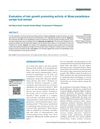A review of the ethnomedicinal, antimicrobial, and phytochemical properties of Musa paradisiaca (plantain)
TLDR Plantain has potential medicinal benefits but needs more research for safety and effectiveness.
The review of Musa paradisiaca (plantain) highlighted its ethnomedicinal, antimicrobial, and phytochemical properties, emphasizing its potential in traditional medicine and drug bioprospecting. Plantain demonstrated significant antimicrobial activity against bacteria, fungi, and viruses, with methanolic and ethanolic extracts being particularly effective. The presence of phytochemicals such as phytosterols, triterpenes, glycosides, flavonoids, phenols, and saponins contributed to its efficacy. Despite its potential, the review noted limited evidence for antiviral effects and in vivo studies, as well as concerns about toxicity due to cyanide presence and potential drug interactions. Plantain also showed promise in wound healing, anticancer, antidiabetic, and antiulcer applications. The review emphasized the need for further research to understand its mechanisms of action, optimize extraction methods, and ensure safety.
